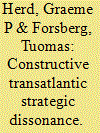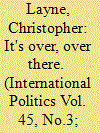|
|
|
Sort Order |
|
|
|
Items / Page
|
|
|
|
|
|
|
| Srl | Item |
| 1 |
ID:
086320


|
|
|
|
|
| Publication |
2008.
|
| Summary/Abstract |
In 2002-2003, the US pressed for and then used coercive force against Iraq and was ultimately supported by 16 of the 26 NATO member states, though not by NATO itself. While the US and Europe shared similar strategic threat perceptions - weapons of mass destruction proliferation, failed states and terrorism - but difference were apparent on the conceptual level. Here diverging political outlooks, differing comparative advantages, and capability bottlenecks all help account for different policy responses and priorities, particularly with regards to Iraq. The consequences and implications for European security and transatlantic relations of the Iraq war were more palpable than its causes: the rift fractured pre-existing transatlantic fault lines and consolidated realignments around concepts of 'Atlantic Europe', 'Core Europe', 'New Europe' and 'Non-aligned Europe'. The dynamic events before and after the US-led Iraq war of 2003 and the policy and identity, ideational, institutional and power shifts that underpinned them appear to lack the constructive potential to generate a push for 'strategic renewal' or the destructive power to enforce a total 'strategic divorce'. Strategic dissonance and continued turbulence has become the default transatlantic condition. The dynamics that generate its power still have the potential to resurface and further fragment and paralyse the unity of purpose and action of the transatlantic security community, as well as a constructive potential that can be harnessed.
|
|
|
|
|
|
|
|
|
|
|
|
|
|
|
|
| 2 |
ID:
086317


|
|
|
|
|
| Publication |
2008.
|
| Summary/Abstract |
Euro-American ties - and NATO - have been ruptured, and never again will be the same. Of course, as the historian Lawrence S. Kaplan correctly observed, 'The idea of NATO being in a terminal state has been a topic for pundits since the 1950s' (Kaplan, 1992, 16). It still is. However, today those who argue that the Alliance is in terminal decline have a very strong case to make. There are four reasons for this. First, the Cold War's end has deprived NATO of its essential raison d'être. Second, the European Union has not only taken huge strides toward attaining political and economic unity but now also has taken significant steps to creating the capacity to act independently of the United States in the security arena. Third, the structural effects of unipolarity are pushing the EU in the direction of counter-balancing American preponderance. Fourth, the Iraq war has highlighted the divergent geopolitical interests of the US and the EU.
|
|
|
|
|
|
|
|
|
|
|
|
|
|
|
|
| 3 |
ID:
086318


|
|
|
|
|
| Publication |
2008.
|
| Summary/Abstract |
Although the NATO alliance has suffered from policy disagreements throughout its history, current divisions derive mainly from a shift in US grand strategy associated with the Bush Doctrine, which is based on assumptions of US hegemony, an assertive nationalist approach in relations with other states, including erstwhile allies, and the preemptive/preventive use of force. Although this approach has failed to achieve its objectives, the underpinnings on which it is based are deeply rooted in the American political psyche. Given the different interpretations of the security challenges facing the member states of the NATO alliance system, the deeply imbedded views of uniqueness and hegemony that characterize the American political psyche, and the likely unwillingness of the next generation of US political leaders to revise US policy so fully as to eliminate all aspects of recent US attitudes and behavior, it is highly unlikely that the close institutional relationships that characterized the cold war years will be an important feature of future US relations with European states.
|
|
|
|
|
|
|
|
|
|
|
|
|
|
|
|
| 4 |
ID:
086316


|
|
|
|
|
| Publication |
2008.
|
| Summary/Abstract |
Any nuanced assessment of current transatlantic tensions requires an awareness of their historical context. An understanding of the legacy of the Cold War in particular helps to answer the following questions: (1) What are the sources of current US-European tensions? (2) Has the transatlantic connection sustained mortal damage, or can it endure? (3) What changes of attitude and of focus might help the transatlantic relationship in the future? The argument is as follows: The US-European relationship is under assault not just because of recent US military actions but also because of a longer-term shift away from a successful US Cold War grand strategy that still had much to offer the post-Cold War world. However, cause for alarm is limited, because the history of cooperation, the lack of alternative partners, and the very real nature of external threats means that neither the US nor the Europeans have any realistic alternative to cooperation with each other.
|
|
|
|
|
|
|
|
|
|
|
|
|
|
|
|
|
|
|
|
|